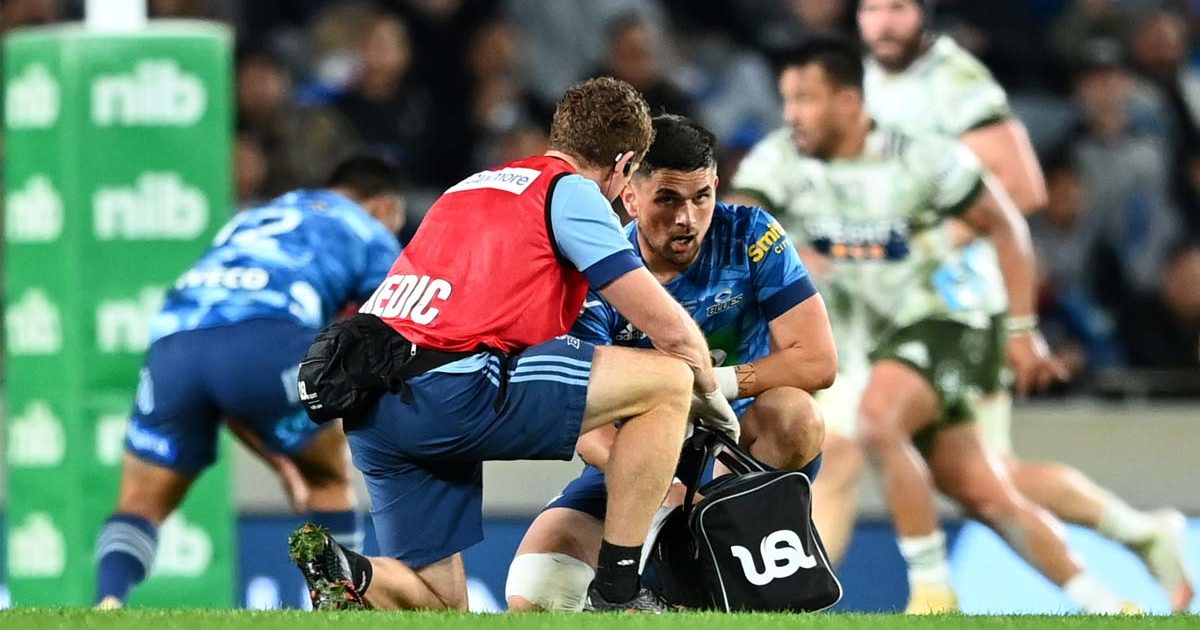'I thought it was pretty bad': The final hit that floored Otere Black

Departing Blues playmaker Otere Black was able to call time on his career with the Super Rugby franchise by guiding them to a Trans-Tasman title – but the 26-year-old was at risk of missing out on much of the final after copping a high shot to Maori All Blacks teammate Ash Dixon in the 24th minute of the match.
Dixon rushed out of the line to put a hit on the Blues No 10 but got the tackle badly wrong, smashing his shoulder into Black’s head.
Referee Mike Fraser ultimately decided that a yellow card was due punishment for the hit, sending Dixon to the sin-bin while Black also left the field for a head injury assessment (HIA).
Both players returned to the game after 10 minutes and Dixon was quick to downplay the incident after the match.
“That was silly from me,” he said. “Na, no way, [it wasn’t malicious]. Not some guy like that. He’s a top bloke and a good man. I was just trying to stop him and just got my timing a bit off.”
You would think that any Super Rugby side in New Zealand would be willing to make room for the @MaoriAllBlacks playmaker. #SuperRugbyhttps://t.co/DcnpCuugTp
— RugbyPass (@RugbyPass) July 7, 2021
Dixon admitted he did fear the worse after the hit – but primarily because he was concerned for the safety of Black.
Not long after the result, Black revealed his own thoughts on the tackle on the latest episode of the What a Lad podcast, hosted by James Marshall.
Marshall, a former teammate of Black’s at the Hurricanes, asked whether a red card would have been warranted for the shot.
“To be honest, I thought it was pretty bad,” Black responded. “Everyone’s got their own opinions and Ash would never ever try and do it to hurt me as well, he’s a nice guy.
“We’ve been joking around about it all day today because the Landers boys just got in today [for the Maori All Blacks camp]. There’s been a few jokes going around camp around Ash, ‘Don’t know how he’s playing this week after that’. Na it’s all good. I’ve pulled up all right and managed to get back out there.”
View this post on Instagram
ADVERTISEMENT
Further punishment may have been considered for Dixon had Black not passed his HIA and returned to the game – eventually guiding the Blues home 23-15. Instead, however, the pair were able to combine to earn the Maori All Blacks a 2-0 series win over Samoa over the past two weekends.
Super Rugby adopted new HIA technology this year, ostensibly designed to produce better, quicker results. Black admitted that the tests he undertook to get back on the field were fairly rigorous, with both old and new methods utilised.
“The HIA’s are tough these days eh? They’re even hard without being concussed so I was actually quite surprised I passed it,” he said.
“They’ve got the new one where you put the glasses on, you’ve got to follow all these dots. I had to do that plus the old one – remember the names and all of those things. Once I passed that, I just had to get through the last one. It just takes ages but we got there in the end.”
Black will play for Bay of Plenty in this year’s NPC before heading to Japan to represent NTT Shining Arcs.










































































